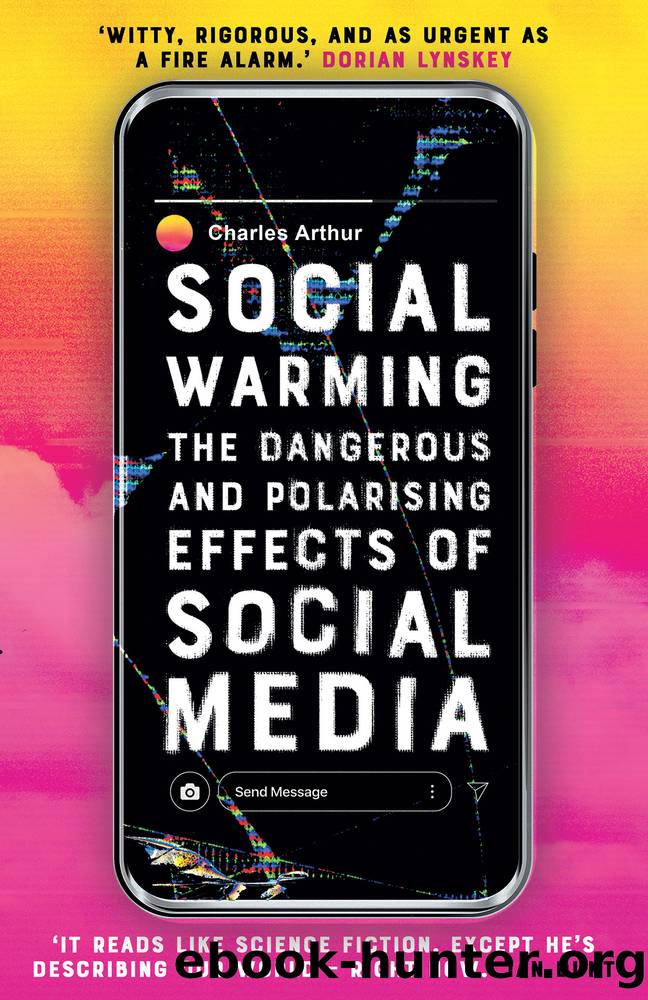Social Warming by Charles Arthur

Author:Charles Arthur [Arthur, Charles]
Language: eng
Format: epub
ISBN: 9781786079985
Publisher: Oneworld Publications
Published: 2021-05-10T00:00:00+00:00
The last element to consider is votersâ interaction with each other over politics, and the democratic process. Here, Facebook in particular has tried to show that it can get people to engage more at the ballot box. Its first attempt to show that social networks really could make a difference to democracy was in 2010, though the experimenters didnât reveal it until two years later. In a letter to the prestigious science journal Nature in September 2012, a seven-strong list of authors, including political scientists and, crucially, members of Facebookâs data science team, described what they called âa 61-million-person experiment in social influence and political mobilisationâ.16 The question they were trying to answer was: could Facebook make people more likely to vote? Previous research had already shown that within households, voting can be âcontagiousâ â if you vote, your housemate is more likely to, and vice versa. Emails urging people to vote, by contrast, were less effective.
On the day of the November 2010 midterm elections in the US, sixty million people found their News Feed had a message encouraging them to vote, a guide to local polling places, and a button to click if they had voted. Some saw a counter of how many Facebook users had clicked the button plus six randomly chosen pictures of Friends who had done so too â a âsocialâ message. A smaller group of about half a million people were shown the message, the counter and button, but no pictures of Friends; a control group, also about half a million people, saw no message, counter or pictures. By examining publicly available voting records, the experimenters could figure out if they had made a difference.
The effect was real: the âsocialâ message led directly to about 60,000 people voting, and another 280,000 who voted because of the behavioural ânudgeâ of seeing their Friendsâ messages of having done so. The effect was strongest among close friends; for those outside the ten closest, it wasnât measurable.
A total of 340,000 votes out of 61 million people, or about 0.55 percent, might not sound a lot. But itâs plenty, in the right context.
Download
This site does not store any files on its server. We only index and link to content provided by other sites. Please contact the content providers to delete copyright contents if any and email us, we'll remove relevant links or contents immediately.
| Anthropology | Archaeology |
| Philosophy | Politics & Government |
| Social Sciences | Sociology |
| Women's Studies |
The Leavers by Lisa Ko(6472)
Born to Run: by Christopher McDougall(6259)
iGen by Jean M. Twenge(4702)
Sapiens by Yuval Noah Harari(4537)
The Kite Runner by Khaled Hosseini(4432)
Spare by Prince Harry The Duke of Sussex(4195)
Bullshit Jobs by David Graeber(3179)
Livewired by David Eagleman(3121)
Goodbye Paradise(2961)
Never by Ken Follett(2880)
A Dictionary of Sociology by Unknown(2518)
Harry Potter 4 - Harry Potter and The Goblet of Fire by J.K.Rowling(2416)
The Club by A.L. Brooks(2359)
People of the Earth: An Introduction to World Prehistory by Dr. Brian Fagan & Nadia Durrani(2346)
The Social Psychology of Inequality by Unknown(2309)
Machine Learning at Scale with H2O by Gregory Keys | David Whiting(2289)
Harry Potter and the Order of the Phoenix (5) by J.K. Rowling(2227)
0041152001443424520 .pdf by Unknown(2220)
Don't Sleep, There Are Snakes by Daniel L. Everett(2216)
